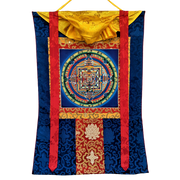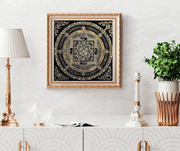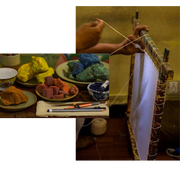Niguma Mandala Thangka
MOTHERS DAY SALE
Get it between - .

Niguma Mandala Thangka – The Yogini of Wisdom
This 100% hand-drawn Thangka, created in the Kathmandu Valley, Nepal, depicts the Niguma Mandala, a powerful symbol of wisdom and spiritual mastery in Tibetan Buddhism. It is perfect for various home décor ideas and can be displayed as an elegant and captivating wall hanging in your home or office. Additionally, it can be placed on your family altar for meditation, spiritual healing, and to attract the benevolent energy of Tibetan Buddhist art.
Specifications
- Dimensions: 53 x 37 cm
- Materials: Tibetan Colors with 24 Carat Gold mixed with Hide Glue
- Canvas: Organic Cotton
- Hand Painted: In Nepal
- Master Quality Rare Thangka
About Niguma Mandala
Niguma is regarded as one of the most influential and revered yoginis in Vajrayana Buddhism, believed to have lived in the 10th or 11th century. A Dakini and co-founder of the Shangpa Kagyu school of Vajrayana Buddhism, Niguma played a key role in the transmission of Tantric teachings and practices. She is depicted as an embodiment of wisdom and compassion, and her teachings continue to inspire practitioners of Vajrayana Buddhism today.
This mandala represents Niguma's profound spiritual legacy and is used as a tool for meditation and spiritual guidance. The circular design of the mandala symbolizes the cosmos, representing the interconnectedness of all things and the infinite cycle of existence. The mandala is a sacred geometry that serves to focus the mind, establish a sacred space, and deepen one’s practice.
Niguma’s figure is often associated with multiple names, such as Yogini Vimalashri, Vajradhara Niguma, and Jñana Dakini (Wisdom Dakini). She is also referred to as "The Sister," highlighting her close spiritual connection with Naropa, the great Buddhist teacher and adept.
Key Benefits
- Spiritual Wisdom: The Niguma Mandala embodies the profound wisdom of one of the most influential female figures in Vajrayana Buddhism.
- Cosmic Symbolism: The mandala represents the universe, offering insight into the interconnectedness of all beings and the spiritual journey.
- Meditative Focus: The mandala serves as a tool to deepen meditation, providing spiritual guidance and aiding in trance induction.
- Blessings of the Dakini: Niguma, as a Dakini, is associated with the transmission of sacred knowledge and spiritual awakening.
A Gateway to Wisdom and Enlightenment
This Niguma Mandala Thangka is not only a beautiful work of art but also a profound spiritual tool that can guide your practice and meditation. May the wisdom and blessings of Niguma inspire your journey towards enlightenment, offering protection, insight, and inner peace.
You can find answers to common questions on our FAQ page here.
View all our shop reviews at reviews page here.



























